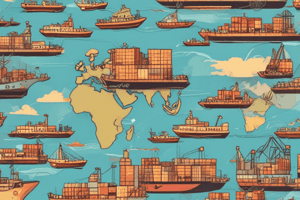Podcast
Questions and Answers
What is the primary goal of the World Customs Organisation's (WCO) trade facilitation efforts?
What is the primary goal of the World Customs Organisation's (WCO) trade facilitation efforts?
- To reduce cooperation among customs administrations
- To increase trade costs and complexity
- To decrease transparency and predictability
- To simplify and harmonize customs procedures (correct)
What is the purpose of the WCO Data Model?
What is the purpose of the WCO Data Model?
- To recognize reliable and trusted traders
- To provide a framework for simplifying and harmonizing customs procedures
- To facilitate the exchange of information between customs administrations and traders (correct)
- To measure the time required for customs clearance
What is the main objective of the Authorized Economic Operator (AEO) program?
What is the main objective of the Authorized Economic Operator (AEO) program?
- To increase trade costs and complexity
- To recognize reliable and trusted traders (correct)
- To reduce customs inspections and priority treatment
- To decrease cooperation among customs administrations
What is the benefit of increased transparency and predictability in trade facilitation?
What is the benefit of increased transparency and predictability in trade facilitation?
What is the primary function of the Single Window platform?
What is the primary function of the Single Window platform?
What is the main objective of the Coordinated Border Management approach?
What is the main objective of the Coordinated Border Management approach?
What is the purpose of the WCO Time Release Study (TRS)?
What is the purpose of the WCO Time Release Study (TRS)?
What is the benefit of reduced trade costs and increased efficiency in trade facilitation?
What is the benefit of reduced trade costs and increased efficiency in trade facilitation?
What is the primary goal of the Revised Kyoto Convention (RKC)?
What is the primary goal of the Revised Kyoto Convention (RKC)?
What is the result of enhanced cooperation and coordination among customs administrations?
What is the result of enhanced cooperation and coordination among customs administrations?
Flashcards are hidden until you start studying
Study Notes
Trade Facilitation
The World Customs Organisation (WCO) plays a crucial role in facilitating trade by simplifying and harmonizing customs procedures, reducing costs, and increasing efficiency.
Key Objectives:
- Simplify and standardize customs procedures
- Reduce trade costs and increase efficiency
- Enhance transparency and predictability
- Increase cooperation and coordination among customs administrations
WCO Instruments:
- Revised Kyoto Convention (RKC): A blueprint for modern customs procedures, providing a framework for simplifying and harmonizing customs procedures.
- WCO Data Model: A standardized framework for collecting and exchanging customs data, facilitating the exchange of information between customs administrations and traders.
- WCO Time Release Study (TRS): A methodology for measuring the time required for customs clearance, helping to identify areas for improvement and increase efficiency.
Trade Facilitation Initiatives:
- Authorized Economic Operator (AEO): A program recognizing reliable and trusted traders, providing them with benefits such as reduced customs inspections and priority treatment.
- Single Window: A platform for submitting and processing trade-related information, reducing the need for multiple submissions and increasing efficiency.
- Coordinated Border Management: A collaborative approach to border management, involving cooperation among customs, immigration, and other agencies to facilitate the movement of goods and people.
Benefits:
- Reduced trade costs and increased efficiency
- Increased transparency and predictability
- Improved compliance and reduced risk
- Enhanced cooperation and coordination among customs administrations
- Increased competitiveness and economic growth
Trade Facilitation
Role of World Customs Organisation (WCO)
- Facilitates trade by simplifying and harmonizing customs procedures, reducing costs, and increasing efficiency
Key Objectives
- Simplify and standardize customs procedures
- Reduce trade costs and increase efficiency
- Enhance transparency and predictability
- Increase cooperation and coordination among customs administrations
WCO Instruments
Revised Kyoto Convention (RKC)
- A blueprint for modern customs procedures
- Provides a framework for simplifying and harmonizing customs procedures
WCO Data Model
- A standardized framework for collecting and exchanging customs data
- Facilitates the exchange of information between customs administrations and traders
WCO Time Release Study (TRS)
- A methodology for measuring the time required for customs clearance
- Helps to identify areas for improvement and increase efficiency
Trade Facilitation Initiatives
Authorized Economic Operator (AEO)
- A program recognizing reliable and trusted traders
- Provides benefits such as reduced customs inspections and priority treatment
Single Window
- A platform for submitting and processing trade-related information
- Reduces the need for multiple submissions and increases efficiency
Coordinated Border Management
- A collaborative approach to border management
- Involves cooperation among customs, immigration, and other agencies to facilitate the movement of goods and people
Benefits
- Reduced trade costs and increased efficiency
- Increased transparency and predictability
- Improved compliance and reduced risk
- Enhanced cooperation and coordination among customs administrations
- Increased competitiveness and economic growth
Studying That Suits You
Use AI to generate personalized quizzes and flashcards to suit your learning preferences.




